First Lady Melania Trump may have had a hand in convincing her husband that President Vladimir Putin was not negotiating in good faith, leading him to issue his latest ultimatum against Russia on Ukraine.
Frustrated with the lack of progress on a peace deal, President Donald Trump announced on Monday that he would slap Russia with 100 percent tariffs in 50 days if Putin failed to reach an agreement during a meeting with North Atlantic Treaty Organization (NATO) Secretary General Mark Rutte at the White House.
“We’ve very, very unhappy with them, and we’re going to be doing very severe tariffs if we don’t have a deal in 50 days,” Trump said. “Tariffs at about 100 percent. You call them secondary tariffs.”
During the meeting, the president described conversations with his wife as he negotiated with Putin over the last several months, when Trump would report on “pleasant” conversations with the Russian leader—only to be undercut by Putin’s continued aggression in Ukraine.
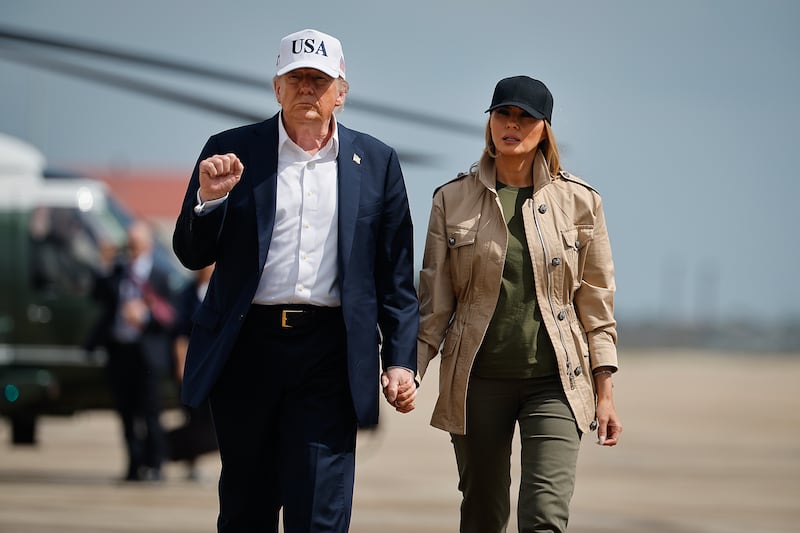
“I go home. I tell the first lady ‘I spoke to Vladimir [Putin] today. We had a wonderful conversation.’ She said ‘oh really? Another city was just hit,’” Trump recalled in the Oval Office on Monday.
Trump expanded on his chats with Melania at another White House event Monday afternoon.
“We thought we had a deal numerous times,” he said. “I get home, I’d say, ‘First Lady, I had the most wonderful talk with Vladimir. I think we’re finished.’ And then I’d turn on the television or she’ll say to me one time, ‘Well that’s strange because they just bombed a nursing home.’”
Trump said on Monday that Putin’s sweet-talking had “fooled a lot of people” but that he understands who he is dealing with.
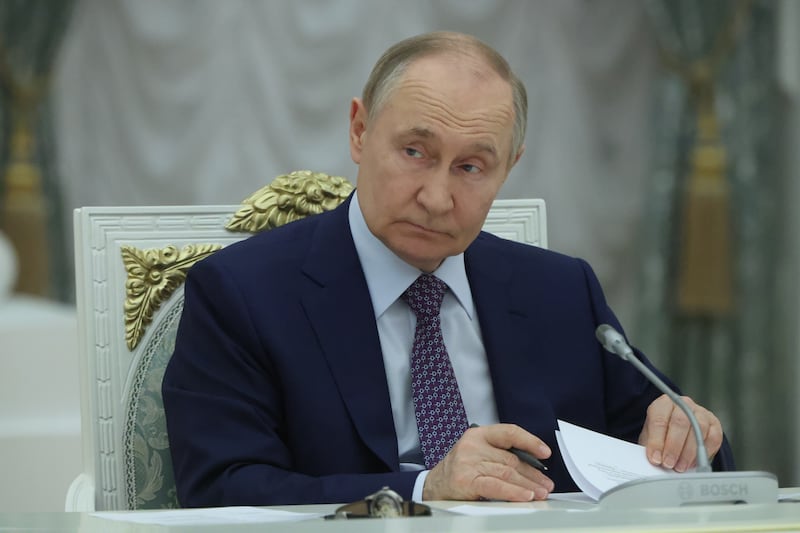
“I don’t want to say he’s an assassin, but he’s a tough guy,” Trump said. “He’s proven that over the years.”
The president said on Monday he hopes the U.S. does not have to impose the tariffs on Russia but has been hearing “so much talk, it’s all talk” as Putin continues to bomb Ukraine.
Meanwhile, the U.S. has reached a deal to sell more weapons to NATO. Trump and Rutte said in the Oval Office that the U.S. will send Ukraine the weapons it needed for the war through NATO.
“I think this is a chance of getting peace, or it’s just going to be the same thing. I have to tell you, Europe has a lot of spirit for this war,” the president said.
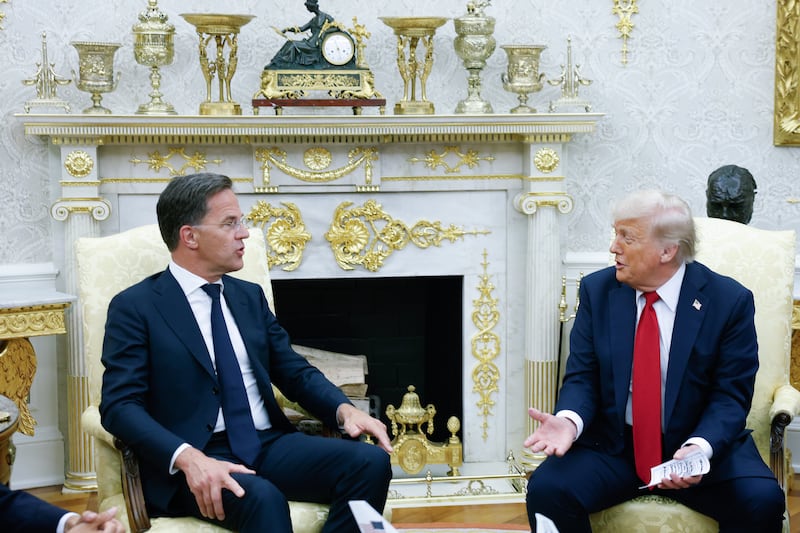
Trump’s White House announcement comes as Congress has also moved forward with legislation imposing sanctions on Russia.
The president on Monday questioned whether the bill was necessary but indicated his tariff announcement was separate and that he supported Congress moving forward independently.
“I don’t know what they’re going to end up with. They may have it at 100, too, they may have it at 500,” Trump said. “They said they’ll have it as quickly as I need it, so we’ll see.”
GOP Sen. Lindsey Graham of South Carolina said on Sunday ahead of the NATO meeting that a “turning point regarding Russia’s invasion of Ukraine is coming” and that, while the president had held off on imposing sanctions on Russia, “that door is about to close.”
Graham introduced a bipartisan Russia sanctions bill with Democratic Sen. Richard Blumenthal of Connecticut earlier this year that received overwhelming support in the Senate. It would not only target Russia but also threaten countries that do business with the Kremlin—like China, India, and Brazil—with as much as 500 percent tariffs to further increase pressure on Putin.
Graham described the move as a “sledgehammer” that Trump can wield to go after the Russian economy and those who prop up his war machine in an interview on CBS News on Sunday.
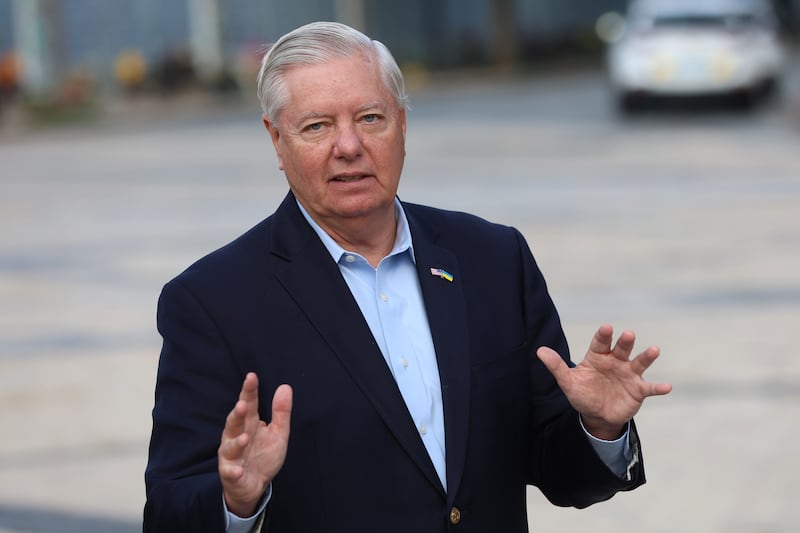
The legislation does give the president a waiver, so he has flexibility and could remove the sanctions should he so choose. The provision was critical to get Trump onboard but has been criticized by some Democrats who support more stringent sanctions.
Blumenthal argued that the waiver is similar to provisions in past measures that give the president the ability to act but provide congressional oversight.
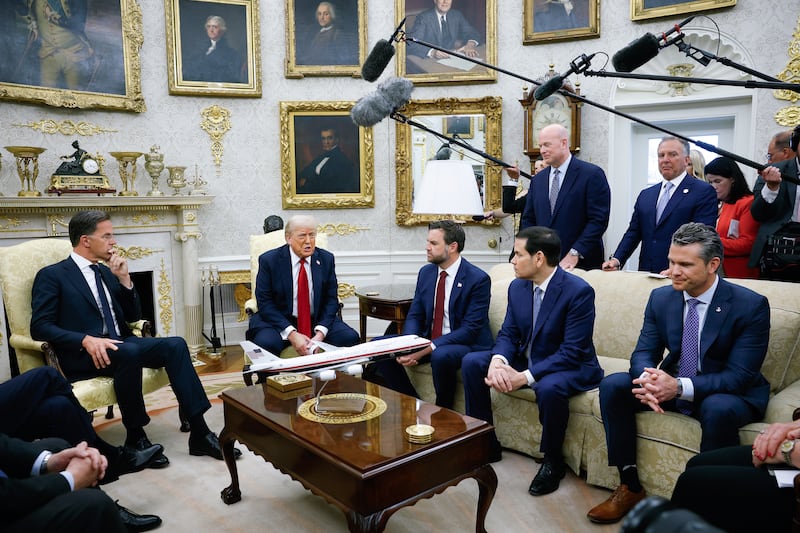
After months of waiting to see if the president could negotiate a deal, Senate Majority Leader John Thune said last week that lawmakers had been working with the president, and he hopes the Senate could pass the Russia sanctions bill before heading out for the August recess. House Speaker Mike Johnson similarly expressed support for the legislation.
While Trump was meeting with the NATO secretary general at the White House on Monday, U.S. Special Envoy for Ukraine Keith Kellogg was in Kyiv, where he met with Ukrainian President Volodymyr Zelensky.
Ahead of the announcement on Sunday, Trump also said the U.S. would send Ukraine Patriot air defense missile systems as it continues to be hammered by Russia.
The Pentagon briefly paused weapons shipments to Ukraine, which the president previously said he did not order, but shipments have since resumed.
Asked about the Patriot systems on Monday after announcing the NATO deal, Trump indicated the U.S. would be sending more Patriot systems to Europe.
He said the systems would be going out “within days” and that the systems would be handled through coordination with NATO.






